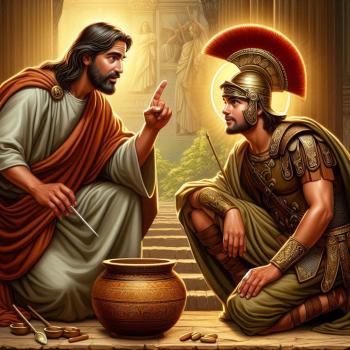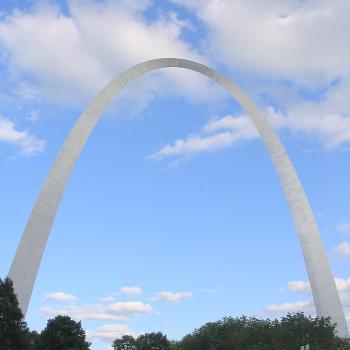To what biblical concept is Jesus' alluding with reference to living waters flowing from the stomach? It is likely this has reference to the eschatological belief that the waters of life will flow from the temple in the last days and restore the earth to its pristine Edenic state. This concept is first found in Joel 3:18, and greatly expanded in Ezekiel 47:1-12. It is also discussed in Zechariah 13:1 and 14:8-19, where it is explicitly linked with the festival of Sukkot (Zech. 14:18-19). Rabbinic tradition also saw the Sukkot water libation as linked with the prophesied waters of life flowing from the temple (Tosefta, Sukkah 3.3-8, 18). Furthermore, the water-drawing was viewed by Jews as symbolic of the Spirit: "Why did they call [the Court of the Women in the Temple] the place of drawing water? Because it was from there that they drew the Holy Spirit" (Jerusalem Talmud, Sukkah 5.1; Genesis Rabbah 70.1). This precisely parallels John's comment that the flowing waters symbolized the promised outpouring of the Spirit upon the Christians (7:39).
These eschatological waters flow from the temple, which was understood to be the center, or navel of the cosmos (Jubilees 8:19; Ezek. 38:12; Talmud, Sanhedrin 37a). Early Christians likewise made this connection explicit when they saw the river of living waters (Rev. 22:1-4) and eternal light (Rev. 22:5) coming forth from New Jerusalem—precisely the two allegories of water and light Jesus uses in his temple teachings at Sukkot (Jn. 7:37-39, 8:12).
A Prophet from Galilee? (Jn. 7:40-52)
Another objection about Jesus' teachings is raised by the disputing crowds. While some had begun to accept Jesus' messianic claims, others objected that the Messiah is not to come from Galilee, but Bethlehem (7:42, 52). The critics were alluding to scriptures that were understood to prophesy that the Messiah would come from Davidic descent and be born in Bethlehem (2 Sam. 7:12-16; Ps. 89:3-4, 35-37; Isa 9:7, 11:1, 53:3, Mic. 5:2).
These prophecies are described as being fulfilled in other Gospels (Mt. 2:1-5; Lk. 2:4). But in John, Jesus does not respond by claiming that he was indeed born in Bethlehem and thus fulfills their Messianic expectation. Rather, he claims that his ultimate origin is from the Father, rather than from any Davidic lineage. Indeed, in John there is no mention of Jesus' Davidic descent (Mt. 1:1-17; Lk. 3:23-38), Mary's virgin conception (Mt. 1:18-25; Lk. 1:26-38), or Jesus' birth in Bethlehem (Mt. 2:1-12; Lk. 2:1-7). John's focus is entirely on Jesus' relationship with the Father (1:1-18), which for John transcends and supersedes all other issues. This should not necessarily be understood as a rejection of these other claims, but rather points to the belief that the ultimate resurrection and glorification of Jesus renders all those other issues moot.
The Pharisees and ruling priests berated the temple police when they learned that their officers had not arrested Jesus, accusing them of secretly becoming disciples (7:47). The leaders noted that none of the ruling priests or Pharisees had accepted Jesus as the Messiah (7:48). And they are the ones who would know. Jesus' only followers come from the "crowd" (ochlos), who are accursed because they don't know the Law (7:49)—the implication being that Jesus likewise does not know the Law and is accursed (7:15). Ironically, one of their number, Nicodemus, is indeed a secret follower of Jesus (3:1-21), and tacitly criticized these Pharisees and priests for failure to follow their own Law (7:50-51). Here Nicodemus is alluding to Deuteronomy's requirement for an investigation and trial before conviction (Dt. 1:16-17, 17:4, 19:18).
The Jewish elites concluded their objections with what they believed was a decisive argument against Jesus' Messianic pretensions. "Search [the scriptures] and see that no prophet arises from Galilee" (7:52). This is an indirect retort to Jesus' earlier claim that the scriptures indeed testify of him (5:39). If anyone knew what the scriptures said about the birth of the Messiah, it was these educated elites. So the crux of the dispute had become a difference in interpretation of scripture. It was a matter of messianic expectations.
The priestly elites and Pharisees reject Jesus because he does not fulfill their messianic expectations based on their interpretation of scripture. Part of what John is arguing throughout his Gospel is that Jesus does in fact fulfill the Hebrew Bible's messianic prophecies. The priests and Pharisees have fundamentally misunderstood the Scripture. The ultimate vindication of John's Christian reading of the messianic prophecies of the Hebrew Bible is the resurrection of Jesus.
A full version of this column, with extensive references and notes, can be found at DropBox:
http://dl.dropbox.com/u/15865520/Enigmatic%20Mirror/EM-John%207a.pdf
And Academia.edu:
http://byu.academia.edu/WilliamHamblin/Papers/572343/John_7_25-53
Updates and discussion can be followed on Facebook at:
http://www.facebook.com/pages/An-Enigmatic-Mirror/180889785272535





